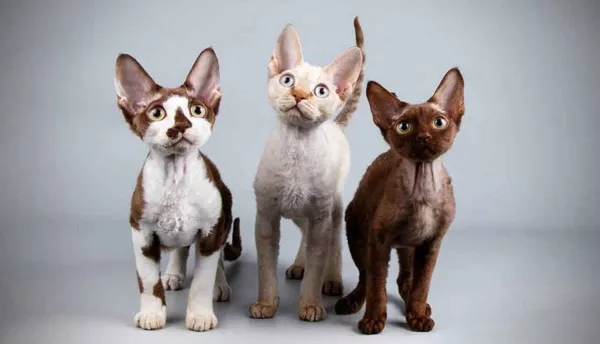The Devon Rex is a distinct and charismatic breed known for its unique appearance and playful demeanor. With its soft, curly coat and large, expressive eyes, the Devon Rex is a beloved companion for many cat enthusiasts. However, prospective and current owners often wonder about the behavioral patterns of this intriguing breed, particularly regarding when Devon Rex cats tend to calm down. This article delves into the characteristics and living habits of the Devon Rex to provide insight into their behavior and to help owners understand when their feline friends might settle into a calmer state.
The Devon Rex: An Overview
Breed Characteristics
The Devon Rex is easily recognizable by its unique physical features. Originating from Devonshire, England, this breed has a distinct appearance that sets it apart from other cats. Here are some of the key characteristics:
Coat: The Devon Rex has a soft, wavy coat that is often compared to the texture of velvet. This coat is the result of a natural mutation that causes the hair to grow in a distinct, curly pattern. Unlike many cats, the Devon Rex has a minimal undercoat, which reduces shedding and makes grooming relatively easy.
Size: This breed is medium-sized, with a slender and muscular build. Males typically weigh between 7 to 10 pounds, while females are slightly smaller, weighing between 6 to 8 pounds.
Face and Ears: Devon Rex cats have a distinctive face with high cheekbones and a short, flat nose. Their large, bat-like ears are one of their most notable features, giving them an expressive and alert appearance.
Eyes: Their eyes are large and round, often giving them an inquisitive and playful expression. The eye color can vary, including shades of gold, copper, and green.
Personality Traits
Devon Rex cats are known for their vibrant and engaging personalities. Here are some traits commonly observed:
Playfulness: These cats are incredibly playful and energetic. They enjoy interactive toys and games that stimulate their physical and mental abilities.
Affection: Devon Rex cats are affectionate and often seek out human companionship. They enjoy being close to their owners and may follow them around the house or curl up on their laps.
Curiosity: Their curious nature means they are often found exploring their environment. They are not easily deterred and can be quite adventurous.
Intelligence: This breed is intelligent and can quickly learn tricks and commands. They are often eager to participate in activities that challenge their minds.
Living Habits of the Devon Rex
Activity Levels
Devon Rex cats are known for their high activity levels. They are typically very active and need regular stimulation to keep them happy. Their playful behavior is a significant part of their personality, and they enjoy interactive play sessions with their owners. Here are some aspects of their activity levels:
Playtime: Regular playtime is essential for a Devon Rex. Engaging them in activities such as fetch or using interactive toys helps channel their energy and keeps them mentally stimulated.
Exploration: Their curious nature often leads them to explore new spaces. They may climb on furniture, investigate new objects, or even try to open cabinets. Providing them with a stimulating environment can help satisfy their need for exploration.
Social Interaction: These cats thrive on social interaction and often enjoy playing with other pets or people. Social play can help burn off excess energy and keep them content.
Sleep Patterns
Despite their energetic nature, Devon Rex cats also need plenty of rest. They tend to have regular sleep patterns and may sleep up to 16 hours a day. Their sleep habits can be influenced by their environment and daily activities:
See Also: What age do Devon Rex cat stop changing color?
Routine: Establishing a routine for playtime and rest can help a Devon Rex cat maintain a balanced lifestyle. Regular sleep periods are crucial for their overall well-being.
Comfort: Providing a comfortable and quiet space for sleeping can help them relax. Soft bedding in a quiet area of the home can encourage restful sleep.
Relaxation: Even though they are active, Devon Rex cats will eventually settle down and enjoy quiet time. This relaxation is often marked by curling up in a favorite spot or resting after a play session.
When Do Devon Rex Cats Calm Down?
Puppyhood to Adulthood
Like many pets, Devon Rex cats go through different stages of behavior as they mature. Understanding these stages can help you anticipate when your Devon Rex might calm down:
Kittens: As kittens, Devon Rex cats are typically very energetic and curious. They engage in a lot of play and exploration, often appearing to have boundless energy. This stage is characterized by high activity levels and constant playfulness.
Adolescence: During adolescence, which can last until around 2 years of age, Devon Rex cats continue to be highly active. They may test boundaries and engage in more complex play. This period is marked by significant growth and development, and their energy levels can still be quite high.
Adulthood: By the time Devon Rex cats reach adulthood, around 2 to 4 years of age, they may start to calm down somewhat. Their energy levels typically decrease, and they become more balanced in their activity levels. However, they will still retain their playful and curious nature.
Factors Influencing Calmness
Several factors can influence when a Devon Rex cat calms down:
Exercise: Regular physical activity can help manage a Devon Rex’s energy levels. Ensuring they have enough playtime and mental stimulation can contribute to a more balanced demeanor.
Environment: A stimulating environment with climbing structures, interactive toys, and safe spaces for exploration can help a Devon Rex channel its energy constructively. A well-enriched environment can also contribute to periods of calmness.
Health: Health issues can impact a cat’s behavior. If a Devon Rex is not calming down as expected, it’s important to consider if there are any underlying health issues that need to be addressed. Regular veterinary check-ups can help identify any potential problems.
Socialization: Proper socialization from an early age can help a Devon Rex adjust to different environments and situations. Cats that are well-socialized tend to adapt better and may exhibit a more balanced behavior.
Behavioral Tips for Managing Energy
Managing the high energy levels of a Devon Rex involves providing appropriate outlets for their activity and ensuring their needs are met. Here are some tips for managing their energy:
Interactive Toys: Provide a variety of interactive toys to keep them engaged. Toys that mimic prey or involve problem-solving can be particularly stimulating.
Play Sessions: Schedule regular play sessions throughout the day. Short, frequent bursts of play are often more effective than long sessions.
Climbing Structures: Invest in climbing structures such as cat trees or shelves. These allow Devon Rex cats to exercise and explore in a safe environment.
Training: Utilize training techniques to channel their energy positively. Training can include teaching tricks or setting up obstacle courses.
Routine: Establish a daily routine that includes playtime, feeding, and rest periods. Consistency can help a Devon Rex adjust to a balanced schedule.
Conclusion
The Devon Rex cat is a fascinating breed with a vibrant personality and distinctive appearance. Understanding their characteristics, living habits, and behavioral patterns is key to managing their energy and ensuring they remain happy and healthy. While Devon Rex cats are naturally energetic and playful, they do tend to calm down as they mature, transitioning from the exuberance of kittenhood to a more balanced adulthood.
By providing them with the right environment, engaging them in regular play, and maintaining a consistent routine, you can help your Devon Rex transition smoothly to a calmer state. With proper care and attention, the Devon Rex can be a delightful and loving companion, offering a unique blend of energy and affection throughout their life.
Related Topics:
























